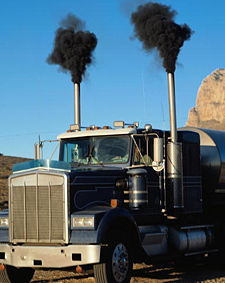
The Nebraska Transportation Center has completed work under a $1 million grant to help retrofit commercial trucks with auxiliary power units, known as APUs, reducing emissions and saving thousands of gallons of diesel fuel per year.
The center reported 273 trucks were retrofitted. Fleet owners paid 40 percent of the equipment and installation costs, while grant funds covered the remaining costs.
According to Steve Phillips, senior vice president of operations for Werner Enterprises, each APU saves more than 300 gallons of diesel fuel per year as a result of the retrofit. Funding for the project was provided in 2009 through the Environmental Protection Agency's National Clean Diesel Funding Assistance Program from the American Recovery and Reinvestment Act.
Project principal investigator Larry Rilett, director of the Nebraska Transportation Center and a UNL civil engineering professor, worked with diesel fleet owners Werner Enterprises, headquartered in Omaha and one of the five largest truckload carriers in the United States; Dynamic Transit of St. Louis; and Barlow Truck Line of Faucett, Mo.; to administer funds to help offset the cost of purchasing EPA-verified APUs for their diesel-powered trucks.
Rilett said APUs function even when the engine is shut down, providing the power needed to keep the truck cabs livable when the truck is not in motion and eliminating most idling time. For each truck, this retrofit saves about $1,200 in fuel for each year of useful life of the APU.
Truck component manufacturers reduced production during the recession, but this project helped to spur more demand for these components and preserved hundreds of regional manufacturing jobs, Rilett said. Originally, the proposal estimated that 188 APUs would be installed through the funds awarded; however, a reduction in equipment costs meant that 45 percent more APUs could be installed.
In addition to the significant economic benefits of the retrofits, the environmental impact of the project is enormous, Rilett said. The drop in diesel consumption causes a substantial reduction in airborne pollutants, including carbon dioxide, nitrous oxide, and particulate matter. Werner Enterprises reported that the installation of APUs on its fleet has led to an annual reduction of nearly 1,000 tons of carbon dioxide.
These retrofitted fleets travel across the United States, including urban areas where air quality is poor. Diesel emissions are known to contribute to respiratory and pulmonary disease. According to the EPA's Diesel Emissions Quantifier, the reduction in emissions from this project could provide approximately $326,400 in health benefits each year, based on avoided incidences of health effects such as bronchitis, asthma, nonfatal heart attacks, hospitalizations and lost work days.
Rilett said these benefits will continue to accrue for several years, helping fleet owners in Nebraska and throughout the region operate cost-effectively and continue to grow.
- Charise Alexander, Nebraska Transportation Center
More details at: http://go.unl.edu/kam